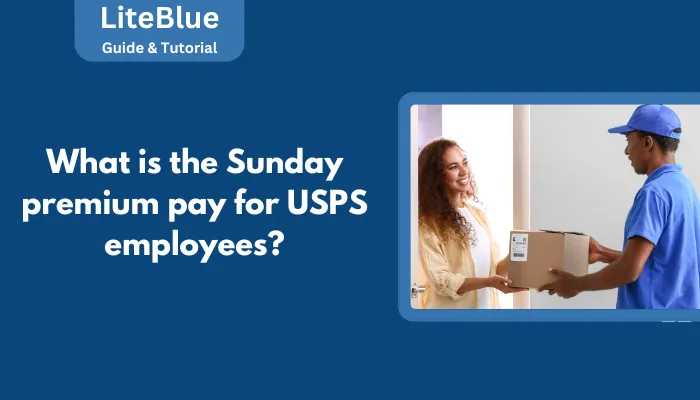Have you ever wondered, “What is the Sunday premium pay for USPS employees?” If you’re curious about how postal workers get paid when they work on Sundays, you’ve come to the right place!
In this blog, we’ll explore the details of Sunday premium pay, why it’s important, and how it benefits USPS employees. If you’re a USPS worker or just want to know more about it, keep reading! And don’t forget, if you work for USPS, you can always check LiteBlue for updates on benefits like these.

What is Sunday Premium Pay?
Before we dive deep into how Sunday premium pay works, let’s first understand what it is. Simply put, Sunday premium pay is extra money that USPS employees get paid for working on Sundays. This is not the regular pay they get for working weekdays. It’s an added bonus or “premium” to encourage employees to work on Sundays when fewer people are available.
Why Do USPS Employees Get Sunday Premium Pay?
You might be wondering, “Why does USPS even offer Sunday premium pay?” Well, it’s because delivering mail doesn’t stop just because it’s the weekend! Here are a few reasons why USPS employees get Sunday pay:
- More Demand on Sundays: Since people are at home on Sundays, there is more demand for mail to be delivered, especially packages.
- Harder to Find Workers: Sundays are a day when many employees prefer to have off. So, USPS offers premium pay to motivate workers to come in.
- Encouraging Work on Weekends: Offering extra pay helps make sure that there’s always someone available to work when needed.
Now that we know the basics, let’s explore the Sunday premium pay in detail.
How Much is the Sunday Premium Pay?
In this section, we’ll break down how much USPS employees actually earn for working on Sundays. Let’s look at the difference between regular pay and Sunday premium pay.
Regular Pay vs. Sunday Premium Pay
So, what is the Sunday premium pay for USPS employees, compared to their regular pay? Here’s a simple breakdown to help you understand.
- Regular Pay: This is the pay USPS employees get for working Monday to Saturday.
- Sunday Premium Pay: Employees get an extra 50% of their hourly pay rate for working on Sundays. This means if you’re paid $20 an hour, you would earn $30 an hour for working on Sunday.
Here’s an example:
| Day | Hourly Rate | Extra Pay for Sunday |
|---|---|---|
| Monday-Saturday | $20 | $0 |
| Sunday | $20 | $30 (includes extra 50%) |
Why Does USPS Offer This Extra Pay?
USPS knows that Sunday is a day most people want off. So, they offer the Sunday premium pay to make sure that employees are motivated to work. Plus, it helps USPS meet its goals of delivering packages and letters on time.
To recap, Sunday premium pay means USPS employees earn 50% more per hour for working on Sundays. It’s a great way to reward those working during less convenient hours.
Who Gets Sunday Premium Pay?
You might be asking, “What is the Sunday premium pay for USPS employees, and who gets it?” Well, not everyone gets this bonus. Sunday premium pay is mainly given to postal employees who work on Sundays. Here’s who qualifies:
- Full-Time Employees: If you are a full-time USPS worker and you work on a Sunday, you get the premium pay.
- Part-Time Employees: Part-time employees who work on Sunday can also get the premium pay, but it depends on how many hours they work.
- Certain Job Roles: Some job roles may be eligible for Sunday premium pay, especially those related to package delivery and sorting.
Here’s a breakdown of who gets the Sunday premium pay:
- Full-Time Postal Workers
- Part-Time Postal Workers
- Package Handlers and Delivery Workers
- Certain Administrative Roles (based on work needs)
So, whether you work in the sorting facility or deliver packages, you could get Sunday premium pay if you’re working that day!
What is the Policy on Sunday Premium Pay?
The Sunday premium pay policy is explained in USPS’s union agreements and guidelines. Employees must meet certain conditions to qualify for Sunday premium pay. Let’s look at the key rules:
- Must Work on Sunday: You can’t just take the day off and expect extra pay. You need to actually work on Sunday.
- Eligible Job Roles: Certain jobs, like package handlers, delivery personnel, and clerks, are more likely to get this premium pay.
- Union Agreement: The Sunday premium pay is also part of union contracts, meaning that if you are part of a union, your agreement will specify exactly how much extra pay you get.
So, “What is the Sunday premium pay for USPS employees?” It’s an extra 50% for working on Sunday, but only if you’re scheduled and work in an eligible role.
Does Sunday Premium Pay Apply to All USPS Locations?
Now you might be wondering, “What is the Sunday premium pay for USPS employees if they work in different locations?” Yes, the Sunday premium pay applies at all USPS locations, but the specific details might vary based on certain factors:
- Big Cities vs. Small Towns: In bigger cities, there’s usually a higher demand for weekend delivery, so more employees may work on Sundays and get premium pay.
- Rural Locations: Even in rural areas, USPS employees can earn Sunday premium pay, but there might be fewer shifts available.
Key Points:
- Applies Nationwide: No matter where you work, if you’re a USPS employee working on a Sunday, you’re eligible for the extra pay.
- Different Locations, Same Pay Structure: While the work schedule and shifts might differ, the Sunday premium pay remains the same across all USPS locations.
To sum up, Sunday premium pay applies nationwide, regardless of location. Whether you’re in a big city or a rural area, working on Sunday can earn you extra pay.
How Does Sunday Premium Pay Benefit USPS Employees?
“Why is Sunday premium pay so important?” you might ask. Here are a few ways it benefits USPS employees:
- Increased Earnings: Extra money for working on Sundays can make a big difference in an employee’s paycheck.
- Job Satisfaction: It makes working on weekends more appealing, especially since it’s hard to get workers for Sunday shifts.
- More Flexible Schedules: Some employees might prefer working on Sundays to have other days off during the week.
Here’s a list of the benefits:
- Extra Earnings on Sundays
- More Incentive to Work
- Helps USPS with Delivery Goals
- Provides More Flexibility for Employees
In summary, Sunday premium pay benefits USPS employees by increasing earnings and offering flexibility. It motivates workers to stay on the job while helping USPS meet its goals.
Conclusion
So, what is the Sunday premium pay for USPS employees? It’s a way for USPS to encourage employees to work on Sundays, offering them an extra 50% of their hourly rate. This helps ensure that packages and mail are delivered on time, especially during weekends when fewer employees are available. If you work for USPS, you can always check LiteBlue for updates on pay and benefits. Sunday premium pay is a great way for USPS to keep operations running smoothly and for employees to earn a little more on the side.
Now you know all about Sunday premium pay, and hopefully, you have a clearer idea of why and how it works!
